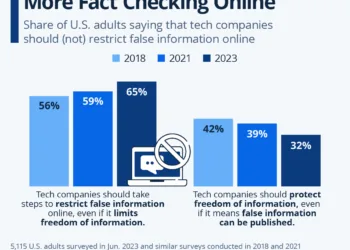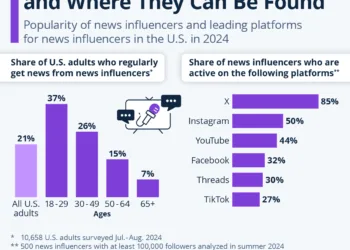Social media can offer a lot of enjoyment, utility, and opportunities for connection, but not every platform is equal. After witnessing both the rise and decline of various social media startups, I’ve become increasingly discerning about the platforms I choose to engage with. There are specific warning signs that prompt me to steer clear of certain platforms. Here are some key factors that can quickly lead me to dismiss a site or app…
1 Vague or Absent Privacy Policies
When a social media platform lacks a clear and comprehensible privacy policy, it raises an immediate red flag for me. A well-structured privacy policy should clearly state what data the platform collects, how it uses that data, and whom it shares it with. If this information is either absent or articulated in a way that seems purposely ambiguous, it suggests that the platform may not be transparent about its practices.
Even worse is the absence of a privacy policy entirely, or if it’s so thoroughly concealed in legal jargon that it’s nearly impossible to decipher. This usually indicates an intention to obscure how user data is handled.
A prime example of this importance is the downfall of the once-promising app, Path. The app faced backlash after it was revealed that it was secretly gathering user data without proper consent, leading to its swift decline. If a platform cannot be forthright about its data handling, it’s prudent to approach with caution.
2 Excessive Permission Requests
Another red flag is when a social media application requests more permissions than it actually needs. If an app seeks access to my contacts, location, or camera without a legitimate reason for its core functions, I become skeptical.
For instance, while a messaging app may need access to my contacts to facilitate connections, requesting microphone or location access without a clear purpose feels invasive.
Requests for excessive permissions often imply that the platform is attempting to collect as much data as possible, regardless of its relevance to user experience. This could lead to improper data handling, sales, or even breaches of security.
3 Overt Political or Ideological Bias
When a social media platform unabashedly promotes a specific political or ideological viewpoint, it’s an instant dealbreaker for me. It’s one thing for users to voice their opinions; however, when the platform itself actively advances a specific agenda—whether through content algorithms, selective moderation, or direct messaging—it creates a hostile environment for diverse opinions.
I prefer platforms that nurture open discussions, where individuals from varied backgrounds can freely express their viewpoints without the fear of suppression or unfair favoritism based on their beliefs. If I observe that a platform seems crafted to amplify one viewpoint while stifling others, I question its commitment to fairness and transparency.
Take Parler, for example; it became known for its particular political slant, which ultimately narrowed its user base. Rather than fostering balanced discourse, it attracted those with similar views, leaving others feeling marginalized. This bias stifled diverse perspectives and created an echo chamber.
4 Limited Control Over Personal Data
Privacy settings should be user-friendly and easy to find. However, many platforms make it seem like a daunting task. If a platform limits my ability to manage who can see my data or how much information I’m sharing, I start to doubt its intentions.
Consider the ongoing challenges Facebook faces in allowing users to control their personal information. Despite significant criticism over the years, their settings remain convoluted. If I feel like my data is slipping away from my control, I know it’s time to reconsider my membership on that platform.
5 A Complicated Account Deletion Process
Leaving a platform should be as straightforward as joining one. When companies make account deletion unnecessarily complicated, that’s a major warning sign. Some even bury the option under layers of menus or ask users to jump through hoops by contacting support or filling out forms. It’s clear they’re reluctant to lose users, which raises ethical concerns.
Instagram faced criticism when it first launched its Threads app, as deleting your Threads account required deleting your entire Instagram account as well. Fortunately, they recognized the error and separated the two, allowing users to delete their Threads profile independently. A platform that genuinely values its users won’t make it difficult to part ways.
6 Poor Content Moderation
Effective content moderation is essential; when a platform fails to manage harmful or inappropriate content adequately, it’s a dealbreaker. Issues like harassment, misinformation, and graphic content can create an unsafe atmosphere.
A classic case is Yik Yak, which became a hotbed for cyberbullying and toxic behavior due to its insufficient moderation. Without the proper checks in place, any platform can devolve into a space for harmful content, and that’s an environment I choose to avoid.
7 Frequent Security Breaches
A single data breach can occur on any platform, but when these incidents happen frequently, it reflects deeper problems at play. Regular security breaches indicate a lack of prioritization for user safety and a failure to address vulnerabilities effectively.
Consider Yahoo’s history—its multiple breaches exposed billions of accounts over the years, shedding light on persistent security issues. This level of negligence puts personal information in jeopardy, and it’s not a platform I would trust.
While it’s easy to get caught up in the allure of new social media platforms and the connections they promise, I’ve learned to be more selective over time. If a platform shows any of these red flags—be it lack of transparency, intrusive data practices, or biased content moderation—it’s a clear indicator that it may not be the right choice for me.










